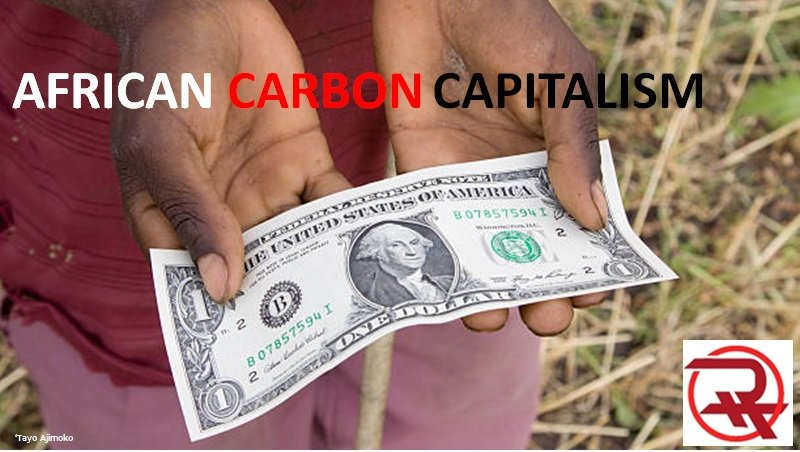There is considerable outcry about Africa’s carbon capitalism in recent times. Carbon capitalism refers to the economic system where countries capitalize on carbon-related activities, such as carbon trading, renewable energy projects, and carbon offset initiatives, to drive economic growth while mitigating environmental impacts.
Carbon capitalism involves intertwining economic growth with environmental sustainability and has garnered significant attention in recent years. For African countries, endowed with abundant natural resources and facing pressing economic challenges, embracing carbon capitalism presents both opportunities and challenges.
This article delves into the intricacies of carbon capitalism in Africa, exploring its potential to drive economic growth while mitigating environmental degradation. Here are examples illustrating carbon capitalism in Africa:
- Renewable Energy Projects: African countries are increasingly investing in renewable energy sources such as solar, wind, and hydroelectric power. For example, Kenya’s Lake Turkana Wind Power Project is one of the largest wind farms in Africa, contributing to clean energy generation and reducing carbon emissions.
- Carbon Trading: Some African nations participate in international carbon trading markets, where they earn revenue by selling carbon credits generated through emission reduction projects. For instance, South Africa’s carbon tax system incentivizes companies to reduce emissions or purchase carbon credits to offset their carbon footprint.
- Afforestation and Reforestation: Countries like Ethiopia have implemented large-scale afforestation programs to combat deforestation and sequester carbon dioxide. The “Green Legacy” initiative aims to plant billions of trees annually to restore degraded landscapes and mitigate climate change.
- Sustainable Agriculture: Practices such as conservation agriculture, agroforestry, and organic farming contribute to carbon sequestration in soils while enhancing agricultural productivity. Uganda’s “Trees for Global Benefits” project promotes agroforestry systems, providing farmers with incentives for tree planting and carbon offset credits.
- Eco-tourism: African countries capitalize on their natural landscapes and biodiversity to develop sustainable tourism ventures. For example, Rwanda’s Volcanoes National Park offers gorilla trekking experiences, generating revenue while preserving habitat and promoting conservation efforts.
Opportunities of Carbon Capitalism in Africa
- Renewable Energy Investments: African countries can capitalize on carbon credits and incentives to attract investments in renewable energy projects, such as solar and wind farms.
- Carbon Trading: Participation in international carbon trading markets allows African nations to monetize their carbon reduction efforts, generating revenue streams.
- Sustainable Agriculture: Implementing carbon sequestration practices in agriculture, such as agroforestry and soil carbon storage, can enhance soil fertility while sequestering carbon dioxide.
- Eco-tourism: Leveraging Africa’s rich biodiversity and natural landscapes, eco-tourism initiatives promote sustainable tourism practices while generating income and preserving ecosystems.
Challenges of Carbon Capitalism in Africa
- Lack of Infrastructure: Limited infrastructure and technological capacity hinder the adoption of renewable energy and carbon capture technologies.
- Policy and Governance Issues: Weak regulatory frameworks and governance structures impede effective implementation of carbon pricing mechanisms and emission reduction policies.
- Socioeconomic Disparities: Unequal distribution of benefits from carbon capitalism exacerbates existing socioeconomic disparities, particularly affecting marginalized communities.
- Dependence on Fossil Fuels: Despite the potential for renewable energy, many African countries remain reliant on fossil fuels, hindering the transition to a low-carbon economy.
Conclusion
In conclusion, carbon capitalism offers a dual opportunity for African countries to achieve economic prosperity while addressing climate change and environmental degradation. However, realizing these benefits requires concerted efforts to overcome challenges and foster sustainable development pathways. By embracing renewable energy, sustainable agriculture, and eco-tourism initiatives, Africa can harness the potential of carbon capitalism to foster inclusive and resilient economies.
Overall, carbon capitalism in Africa encompasses a range of initiatives aimed at promoting economic development while reducing carbon emissions and fostering environmental sustainability. These examples demonstrate the diverse opportunities for African nations to embrace carbon-conscious practices and leverage them for socioeconomic advancement.
References
- UNDP. (2020). Africa’s Carbon Market: Opportunities and Challenges.
- World Bank. (2019). Carbon Pricing Watch 2019: Pricing Carbon Efficiently for a Low-Carbon Future.
- FAO. (2018). Climate-Smart Agriculture Sourcebook.
- UNEP. (2021). Africa’s Adaptation Gap Report 2021: Accelerating Adaptation Action in Africa.

